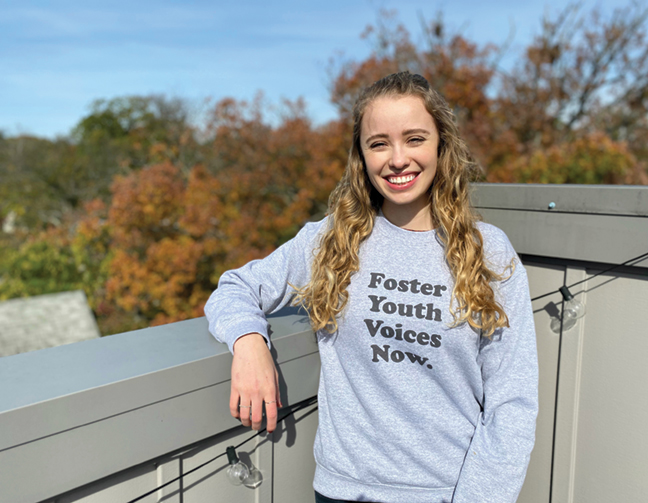
Penn’s newest Rhodes Scholar plans to help kids who grew up like her.
Mackenzie Fierceton C’20 SPP’21 wrote her Rhodes Scholarship application from a hospital bed. After suffering a seizure that sent her epilepsy into overdrive nearly two weeks before the deadline—which is, coincidentally, when she decided to apply—Fierceton had meetings and wrote essays while pushing through a cloud of sedatives.
Now, Fierceton is Penn’s 2021 Rhodes Scholar, beating out more than 2,300 applicants nationwide to become one of 32 Americans to earn a prestigious four-year scholarship to study at England’s University of Oxford.
While at Oxford, Fierceton intends to research the child welfare system and conduct a comparative study of social safety nets in the United States, United Kingdom, and Norway, to determine how welfare programs and social assistance contribute to the foster care-to-prison pipeline.
Foster youth “get swept into incarceration, and a lot of the time it’s for survival crimes,” Fierceton says. “It’s literally for stealing money or stealing things because you don’t have shoes for school or enough money to pay rent if you’re an 18-year-old who just got dropped out of the system.”
Fierceton’s research hits close to home. Having spent time in foster homes in St. Louis, she understands how the system stacks odds against children like her. According to studies, about 50 percent of foster youth graduate from high school and only 2.5 percent from a four-year college. “The overwhelming majority of foster youth do want to complete high school and go on to college or trade school or vocational school,” Fierceton claims. “But then when we get there, we have no support and the wheels just kind of fall off, in a sense.”
Fierceton notes that her experience in the foster system, while still difficult, was an exception to the rule. She went to a private high school, where the adults looked out for her, almost approximating a sense of family. Teachers showed up at soccer games and theater performances, while friends’ families invited her over for holidays and ensured she had clothes and “everything she needed” while she moved through the system.
“For foster youth, in particular, your success is determined by your social support and social capital,” she says. “I got where I am today because I don’t face the innumerable racial, educational, and sociopolitical marginalizations that the vast majority of foster youth experience. That’s why I was able to go to Penn, and why I have access to so many spaces.”
Fierceton is currently pursuing a master’s in social work at Penn with an eye toward reforming the system she spent time in—even if that means having a gentler understanding of the social workers who struggled to support her. “When I aged out of the foster care system, I wanted to get as far away from [it] as possible. I never wanted to talk to another social worker for the rest of my life,” she says, remembering one particular caseworker of hers who never bothered to learn her name after skipping visits for months. At the time, again from a hospital bed, Fierceton emailed “every politician [she] could think of” about how they must reform child welfare and find her a better caseworker.
Now, after working as a caseworker at Penn’s School of Social Policy & Practice’s Goldring Reentry Initiative, which addresses the barriers incarcerated individuals face upon release from Philadelphia prisons, Fierceton has more compassion for those managing heavy caseloads. “People go into it with so much passion and compassion and empathy and a really deep desire to support youth,” she says. “Then they’re overworked and underpaid and have no support in the workplace. So burnout is such a huge problem.”
After finishing at Oxford, Fierceton hopes to return to Philadelphia to do clinical social work while also crafting child welfare policy. “An issue with a lot of policymaking is that the people who are making policy have no firsthand experience and have never worked with the populations they’re writing policy for, so a lot of it doesn’t have the intended effect,” she says.
“After winning the Rhodes, I had this overwhelming sense that people are finally listening to foster youth—seeing us, hearing us, and believing that work needs to be done.”
—Beatrice Forman C’22




